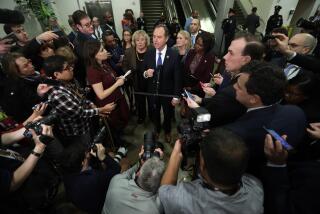Shultz’s Iran-Contra Criticisms Surface : Probe: Independent counsel’s report on scandal reveals that the then-secretary of state harshly condemned Bush and Weinberger.
- Share via
WASHINGTON — Former Secretary of State George P. Shultz considered George Bush a “superficial” politician who was “up to his ears” in the Iran-Contra scandal, according to Lawrence E. Walsh, the independent counsel who investigated the affair.
But Walsh’s final report also said that Shultz himself knew more about then-President Ronald Reagan’s secret arms sales to Iran than he later admitted to Congress.
The report, released Wednesday, holds no major new revelations about the scandal, but it does include some startlingly salty excerpts from the notes of Shultz’s top aides--and a new, more complex picture of the Cabinet officer who did the most to stop the clandestine Iranian deal.
According to the notes of Shultz aide M. Charles Hill, who kept a meticulous daily record of the then-secretary of state’s pronouncements, Shultz was startled to learn how deeply then-Vice President Bush was involved in the Iran-Contra affair--and he believed the scandal probably doomed Bush’s hopes of becoming President.
“He is up to his ears in Iran,” the notes quote Shultz as saying of Bush in 1987. “(He’s) getting drawn into a web of lies,” another note said.
“The whole thing crushes Bush,” Shultz was recorded as saying. “ I don’t think he can get elected now on his own.”
The scandal erupted when it was learned that the Reagan Administration secretly sold weapons to Iran in 1985 and 1986 in order to gain the release of U.S. hostages in Lebanon and to generate funds to aid rebel forces in Nicaragua.
Noting that Bush had wanted to fly to Syria “to have a hostage come back on his plane,” the notes quote Shultz as saying: “There’s a superficiality there.”
Shultz’s policy battles with then-Secretary of Defense Caspar W. Weinberger were legendary at the time, but the notes reveal great personal animosity as well.
“It’s tiresome,” Shultz complained to his aide, according to the notes. “(Weinberger is) dishonest. Says these outrageous things. . . . You don’t have to sit in these meetings and listen to Cap. He’s either stupid or dishonest, one or the other.”
Still, Shultz had higher regard for Weinberger than for William P. Clark, Reagan’s national security adviser from 1981 through 1983. “Cap is an ally in some ways. A real guy,” a 1986 note reads. “Bill Clark has no substance. An influence peddler.”
Shultz, now a fellow at Stanford University’s Hoover Institution, said he considers Walsh’s charges “outrageous” and the publication of his aide’s notes “completely inappropriate.”
“Here you are blowing off steam in the privacy of your office, and all of a sudden it turns up in public,” he said in a telephone interview. “It’s important, from a historical point of view, to keep good written records of important public business, but this kind of thing . . . is creating a tremendous bias against record-keeping.”
It was not immediately clear why Walsh included the pungent excerpts from the Shultz records in his report. However, the report accuses Shultz and Hill of failing to produce all their records until 1991, and Walsh cited the excerpts as examples of “private comments and personal reflections” that the former secretary of state was apparently reluctant to release.
More broadly, Walsh charged that Shultz gave “incorrect” and “misleading” testimony to Congress by minimizing the extent of his knowledge about the arms sales.
“Walsh’s charges are just outrageous,” Shultz said. “I testified to everything I could remember. . . . Nothing was held back at all.”
When the Iran-Contra affair exploded in 1986, Shultz was seen as one of the scandal’s few heroes--the man who opposed the arms sales, battled to stop them, and was thwarted when other high officials lied to him.
But Walsh’s report charges that Shultz knew most of the important details of the deal, chose not to fight, and later tailored his testimony to make it appear that he had been in the dark.
“Shultz’s testimony (to Congress in 1986 and 1987) was incorrect, if not false, in significant respects,” Walsh’s report concluded.
Contrary to his testimony, “Shultz was aware of direct arms transfers from the United States to Iran during 1986,” the report said. “To the extent Shultz did not have complete information regarding the arms transfers, his situation was caused as much by his desire not to know more as it was by efforts at the (National Security Council) staff to conceal information from him.”
But Walsh’s report praises Shultz for his “admirable role” in stopping the arms sales.
More to Read
Sign up for Essential California
The most important California stories and recommendations in your inbox every morning.
You may occasionally receive promotional content from the Los Angeles Times.














